In May I had the great privilege of moderating this rich and fascinating conversation between one of the most renowned chroniclers of Russo-Ukrainian history, Serhii Plokhy and one of the most energetic and engaging champions of Ukrainian culture, writer and chef, Olia Hercules. The event was a collaboration between How To Academy and The Ukrainian Institute London and took place in a packed St James’ Church in Clerkenwell.
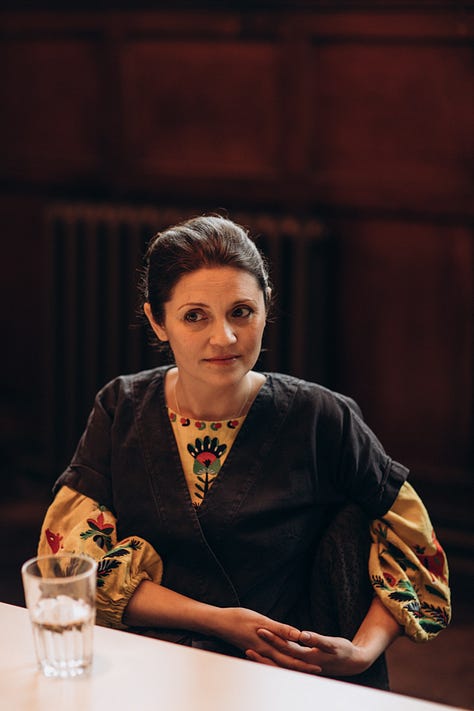
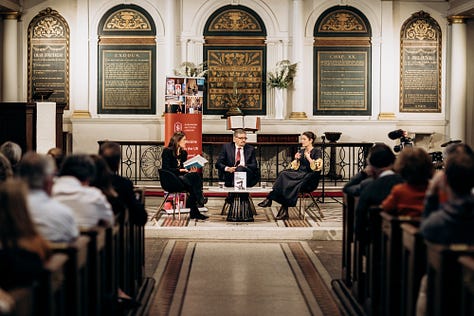
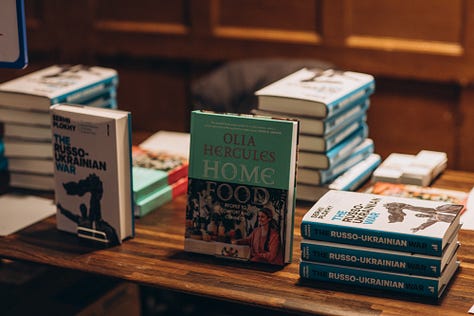
The inspiration was Serhii’s latest book, The Russo-Ukrainian War. a captivating read which gives hugely interesting and detailed context to this era defining war and much more besides. It’s one of those that I want to press into the palms of everyone I meet and so, as is becoming Conversationist custom, three copies of it will go to the first three people to get in touch. And if that’s not exciting enough, you can also choose to win a copy of Olia’s beautiful cook book, Home Food. Simply click the button below!
The three of us discussed the roots and significance of the war, exploring at the same time what it means to be and to feel Ukrainian. How Russian aggression has strengthened and cemented those feelings and reinforced identities and the emergence of a resilient Ukraine with reinvigorated community spirit. A Ukraine that has confounded the expectations, not just of Russia, but of the world, who assumed that this war would be over in a few days. And while no one knows with any certainty what will happen in the coming weeks, months and years, one thing is is for sure: Ukraine has survived. It has proved itself a cultural, military and political force to be reckoned with.
Over then to my two superb guests. Serhii, who is dressed for the occasion in suit and tie and Olia, as ever a resplendent ambassador for her culture in a Vyshyvanka dress which she says: ‘is from the 1940s I think! When people didn't just embroider but also weaved their own material.’
Before we begin it’s important to reiterate that his conversation took place on May 17th. Before the collapse of the Kakhovka dam. Before Biden announced he would be supplying Ukraine with cluster bombs and all the many things that have happened in only a few months. And a lot happens each day in this war. I should also add that this is not a quick read or one to skip over. It proved too hard and felt wrong to whittle down these wise words and collected insight. So I suggest you make yourself a cuppa and allow yourself the time to read and reflect. You’ll feel the richer for it. I know I do.
The Conversation
“The past doesn’t taint the present, the present doesn’t diminish the past.” I thought this was an amazing quote. And I have clung onto it. This is what I will do.
Let’s first hear from Olia as she describes why she was so drawn to Serhii’s book:
“Reading this is not an easy thing to do for a Ukrainian. It’s actually quite triggering. In a way, I kept re-traumatising myself. But what I loved was the feeling it gave me. It gave, and gives, me hope. I have been writing my own history and have decided to close this cycle of intergenerational trauma. In the future, not now. Now I am still going through the motions. But in the future I want to be able to cherish the history but not carry it through to my children. There’s a great quote from Doctor Edith Eger, a Holocaust Survivor who went to visit Auschwitz:
‘The past doesn’t taint the present, the present doesn’t diminish the past.’ I thought this was an amazing quote. And have clung onto it. This is what I will do.
But books like Serhii’s, it is history. In many ways objective, but he has experienced and lived it along with his family, it’s important to have books like this.
The Context and Frustration with the West
From his introduction we learn Serhii has chosen to take ‘a Long durée approach to understanding the current war’ declining ‘the temptation to identify February 24th 2O22 as its beginning.’
I ask him to explain why this was important to him …
‘We are in the 9th year of the war and 2nd year of all out Russian aggression. I wanted to ask: how did we get here? What were the causes? And what is Ukraine? Why did it surprise almost everyone by its resilience? This is a country with a really old and ancient history and Culture. And Olia’s work on Ukrainian cuisine is one manifestation of this.
This war did not begin in February 2022. It began in February 2014, with the Russian special forces taking over the buildings of the Crimean Parliament … That was the start, which was unfortunately very much missed by the West. It is my personal conviction that the sort of solidarity that was shown to Ukraine in 2022, the sort of response Russia got … well, if it had got that in 2O14 we would not be here now discussing this particular book and witnessing what is happening today in Ukraine.
Frustration!? I was trying to hide it. But it looks like I failed!
Listening to Serhii I’m reminded of the overriding feeling I had reading the book - that of intense frustration. It’s exasperating and upsetting to learn of the many missed opportunities over the years. When the world seemed to turn away and ignore the inevitable. Or provide scant help or guarantee of protection when the threat was high.
I ask him about this palpable frustration within the pages and mention the examples he gives of moments when it was most strongly felt.
The Budapest Memorandum of 1994 (see below).
The Russian annexation of Crimea in 2014 which he compares to the Anschluss: ‘Numerous parallels have been drawn between the Crimean annexation and the Austrian Anschluss, as well as the visions of Greater Germany and Greater Russia that inspired them. There were also some similarities in the public perception of those two acts. The Anschluss of 1938 aroused little concern in London and Moscow as it was assumed that Hitler’s appetite for expansion was limited to German ethnic territories. German reaction to Putin’s annexation of the Crimea was similarly calm - up to 40 percent of the German public did not disapprove of his action. In both cases there was hope the aggressor would not go further. It turned out to be wishful thinking at its worst.”
The days and weeks leading up February 2022. CIA Director William Burns and US Secretary of State Anthony Blinken warned President Zelensky of plans to seize Kiev, telling him to to take his security more seriously. Zelensky’s response: “You can say a million times ‘Listen there may be an invasion’ ‘Okay there may be an invasion - will you give us planes? Will you give us air defences?’ ‘Well you’re not a member of NATO’ ‘Oh okay, then what are we talking about.’ Later we hear from the secretary for the National security council Oleksii Danilov who had this message for Western allies:
“don’t scream about this so much. Do you see a threat? Gives us ten planes a day. Not one but ten and the threat will disappear”
‘Ah yes says Serhii with weary humour as far as I’m concerned Ukraine is still waiting for those planes.
“Frustration? I was trying to hide it but it looks like I failed! First we had the Budapest memorandum1 of 1994. Ukraine inherited the third largest nuclear arsenal in the world but agreed to give it away for a piece of paper which gave assurances to protect Ukrainian Sovereignty and territorial integrity.
What really happened was that a major security vacuum was created in the centre of Europe. Weapons were moved, under pressure from the US, to Russia, at exactly the time Russia was making claims on Crimea and Ukrainian Territories. It became a sort of invitation for aggression because Ukraine was not protected by any promises. It’s like someone coming to a wall in a building, punching a huge hole in it and then putting wall paper over it and saying okay, all fine, looks good, lets move on. That wallpaper was the Budapest Memorandum.
Then in 2OO8 we had the Bucharest summit of NATO where Ukraine and Georgia were shown the door when they asked with the encouragement of the US but disapproval of Germany and France, for membership in the alliance. What followed within a few months was Russian aggression against Georgia. And what happens? Germany builds North Stream 1. In 2O14, Russia takes over Crimea and what does Germany do? Builds North Stream 2. There are a lot of reasons to be frustrated or upset but I tried not to show it!”
Every single day I thought, are they burning my books? Are they chopping down the orchard? This has been our experience …
I remember a sense of Olia’s personal frustration at an event we did together shortly after the all out war began. It was clear from her social media posts too, which seemed to say - we knew this was coming, and you should have too!
Olia: ‘In 2O14, for my family and me, it was really scary. I’m not scared of many things, but that was the first time I was absolutely terrified. We were on the edge.
Then in 2O22 what we feared finally happened. My Mum and Dad were here in the UK just before and I begged them not to go back. I said why don’t you stay for an extra month and lets wait it out. Even though none of us really believed it, even up to the days before. We just thought: how is it possible? In a country like Ukraine?! My nephews were having flat whites in Kyiv and making business plans. It was like anywhere else in Europe. You just couldn’t imagine it was going to happen. In February my parents were going out and protesting but then it got too dangerous. My dad got a call from the new Mayor - the collaborator, asking for the keys to Mum’s Airbnb and said: ‘we know you have a son in the territorial army, hand over the keys.’ It was a threat. They basically said, we’re going to come for you. So I made them leave. This was April, a couple of days after Bucha, and I said you have to go NOW. So they packed a suitcase with photographs, some of Mum’s embroidery, some clothes and it took them about 19 hours to get to Kherson because of all the checkpoints. It should have taken an hour.
And now the Russian occupiers are living in our house. Apparently because we have a wood burning stove. And every single day I thought, are they burning my books? Are they chopping down the orchard? So yes. This has been our experience …
Didn’t we all believe wars like this were impossible? That they can’t happen?
This sense of disbelief and denial, the way no one could accept it would happen, not here, not today, was apparently shared even by the man perhaps most ‘in the know’ of all …
‘Among those most surprised by the all-out invasion’ Serhii writes, ‘was …Zelensky … ‘it wasn’t fear on his face’ said the speaker of the Ukrainian Parliament, Ruslan Stefanchuk, who remembered meeting Zelensky’ that morning ‘It was a question: How could this be?”
Serhii says “ I’m still trying to understand this and going through my own experience. On one hand, the night before I called my sister and asked if she had enough gasoline, so clearly I was thinking, yes it can happen. But when it happens it’s still shock and surprise. You think it’s a possibility but you want to think it can’t happen. Because it is, to a degree, so unthinkable, on so many levels. The American edition of this book is called ‘The Return of History’. Many of us think there was some end of history. Of the history of violence, of annexation, of unprovoked wars. Especially when it comes to Russia in Ukraine. No one believed Russians and Ukrainians were one and the same, but there was a feeling that the two were close. And that you don’t wage that sort of war. On top of all else this is largest war in Europe since WWII. Didn’t we all believe wars like this were impossible? That they couldn’t happen? So yes, however you try to prepare yourself it turns out to be inadequate, because you are preparing yourself rationally, but deep down you think, no, it can’t happen. But now it has happened, and Ukraine survived the shock. It’s a new reality.
Ukraine is an agent. It is a place, not just a victim. It refused to become a victim’
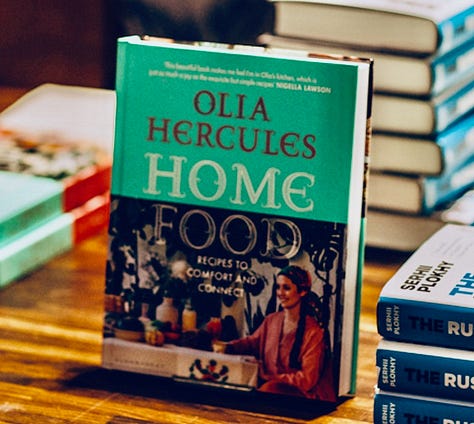
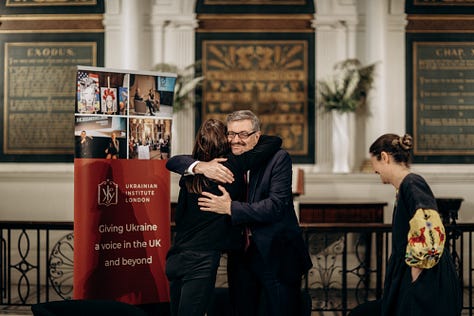
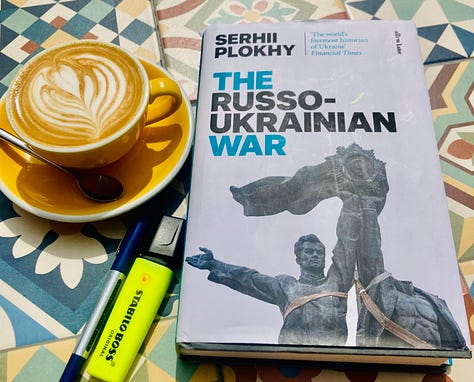
And it’s this ‘new reality’ that the title of Serhii’s book refers to
‘There are no good titles for the war. For any war. Everything is too problematic to describe in a few short words. But for me what was important was the positive surprise that came to the world immediately after the all out war started. One thing the politicians anywhere in the world from Washington to London to Brussels to Moscow agreed on, was that Ukraine would not last long. That Kyiv would fall in a few days. The best hope was that maybe there would be some resistance. The US and UK sent weapons before the war that could be used for partisan warfare but then everyone discovered it was not just groups of partisans running round fighting here and there. But that there was a State that could function under attack, and an army. So in that sense it wasn’t just Russians going in and conducting a war. The title is about changing the perspective of Ukrainian history as well through this war. Ukraine is an agent. It’s a young but strong nation, not just a victim. It refused to become a victim’
What we discover from Serhii’s book is what had happened in the years leading up to the war to create and establish this united, resilient Ukraine - that it emerged largely after 2014, when a very different society emerged:
He writes: “The eight years of hybrid warfare that Russia had waged in the Donbas … turned Ukraine into a different country and society from that of 2014. A country divided by issues of history, culture, and identity when the Crimea was annexed was now united by the desire to defend its sovereignty, democratic order and way of life at any price.’
Ukrainians started uniting across ethnic, religious, linguistic and cultural lines, ‘City and village bookstores were flooded with Ukrainian Language books’ money was spent promoting Ukrainian culture abroad.
And Olia seems to be so much part of this. To have been swept up in this cultural rejuvenation. For years she’s been sharing and promoting Ukrainian culture, primarily through food. Some may have only come to know her recently through the Cook for Ukraine Campaign, set up in 2022, but she has been a passionate and renowned advocate and ambassador for her homeland for years, with her workshops, beautiful Cook books and activism.
I just had my first thought in Ukrainian the other day. And it felt very very good indeed!’
She says ‘2014 was the beginning of all of us changing in a very significant way. I grew up in the South of Ukraine, speaking Russian and Zaporizhia where Serhil is from is also a Russophone city. I grew up with my Grandparents stories - from my grandmother being deported from Mykolaiv to Karelia in the early 1920s, to my Grandad being sent to a gulag. So I’ve always felt Ukrainian. Always felt opposition to the Soviet Rule. But we spoke Russian. And in 2014 we made a decision to speak Ukrainian and actively learn so much more about Ukrainian history, literature and culture which had been suppressed so heavily by the Soviets, especially in the South and East of Ukraine. The standardisation policy was particularly rife there. My parents grew up in Mykolaiv where there were ten schools, only one if which was Ukrainian. And it was the worst. In Russian centric schools you’d be bullied if you spoke Ukrainian, called a peasant and you wouldn’t get anywhere - to university or to get a better job. So we grew up speaking Russian. But in 2014, we said okay it’s going to be hard but we need to do it and make these small steps and changes. I tried, but then I had children and brain fog! … but in 2022 it was a culmination of something that had started, a little embryo of those thoughts and they exploded. And now, one year later I just had my first thought in Ukrainian the other day. And it felt very very good indeed!’
Serhii:
At the Research Institute at Harvard we mapped polling and there was a spike in 2014/15 of people self reporting speaking Ukrainian, then it went down, exactly as Olia describes, particularly in South and East. But 2022 was a turning point. Ukraine survived the assault because it mobilised across the ethnic, religious and linguistic lines. And at the same time that resistance lifted Ukrainian language and culture to a level much above where it had been. After 2014 there was, for first time, the demand and market interest in my books - translated into Ukrainian. Ukraine continues to be a very pluralistic society in many ways but it’s also clear the Ukrainian language and culture are on the rise. It makes a lot of sense given the war started with the claim that Russians and Ukrainians were one and the same people, which meant Ukrainians didn’t exist as a Nation and that Ukrainians are really Russians. This idea of a war to defend Ukrainians who don’t know that they are Russians from oppression - that narrative collapsed on the battlefield in Ukraine.
The sad irony is that the war that started to ‘defend Russians’ but Russian speakers have been most effected by this war. Mariupol, the city that almost doesn’t exist today, was, before the not only a Russian speaking city but ethnic Russians were about 44% of the city for example.
So where did this this ‘narrative’, essentially Putin’s ideology, come from?
Serhii: It’s not original at all. It’s bizarre in the C21st but it comes from Russian Imperial thinking and writing of the C19th when the formation of the modern nation started in Eastern Europe and the empire was challenged by the rise in Ukrainian movement; cultural, political and otherwise. The way to deal with the rise in national awareness was to come up with the idea that one Russian Nation existed. With three ‘tribes’: Great Russians - today’s Russians, Ukrainians - Little Russians, and Belorussians - White Russians. The idea was they could speak different languages and dance different dances but at the end of the day they were all Russians and this, one nation. Putin brings back these ideas and tries to not just to rewrite History but redo history. This is a C19th war in terms of ideology, a C20th War in terms of military tactics and C21st century war in terms of the use of Cyber and social media.
It’s not about genetics, it’s my state of mind, it’s how I understand and see the world, it’s what I have absorbed from my family - love of freedom and liberal views!
OLIA - Putin has such an archaic vision of us as fraternal nations and he doesn’t understand what being Ukrainian means. A few months ago I decided to do a DNA test. Mainly because my paternal Grandmother is originally from Siberia. She moved to Uzbekistan met my Ukrainian grandfather and lived in Ukraine her whole life.
And it was fascinating! The first ten regions were Ukraine, then ten Polish regions then Belorussian and then Russian regions, and 25% Mediterranean because I have Moldavian Great Grandmothers. Fascinating, but at the same time it didn’t really matter because that’s not what makes me Ukrainian. It’s not about genetics it’s my state of mind, it’s how I understand and see the world, it’s what I have absorbed from my family - love of freedom and liberal views! They just don’t get it
I enquire into this ‘they.’ I know she means Russians. But ALL Russians? I have been very sad to see the depth of the divide deepen profoundly since the start of the war when it felt the blame was laid at the feet of one man, of Putin. Now the exasperation seems to extend to all Russians and the damage to cultural relations feels significant, perhaps irreparable.
Olia replies: “They? Russians - the occupiers, the attackers, whoever supports the war and believes the narrative”
In the book Serhii writes: Far from inspiring gratitude for ostensible fraternal assistance the war helped destroy a number of Russian Imperial and Soviet Myths. Instead of arresting the development of the Ukrainian Nation and destroying its commitment to sovereignty, the Russian invasion in general and the assault on Kyiv in particular strengthened the people's sense of identity and unity endowing it with a new raison d’etre, new narratives and new heroes and martyrs”
Seems that is exactly what Olia experienced? Did this all strengthen her sense of identity as Ukrainian.
Watch her answer here.
Serhil: I am astonished listening to Olia talk, how much it reflects my experience. The story was simple: Grandparents speak Ukrainian, parents went to University and speak Russian. My mother graduated from a secondary school doing exams in Ukrainian, but then had to learn everything in Russian when she got to the medical school. Graduating from Ukrainian school means higher education is closed for you. So there’s a discussion as to whether or not Ukraine was a colony. But that situation produced a sort of civic identity and later a political identity that was not linked to the language. That is the sort of identity that the Russian leaders ‘don’t get.’ They think about the nation in terms of C19th ie Language equals nation: you speak Russian you are probably Russian so you are supposed to welcome the Russian Troops. But in Ukraine a number of generations spoke Russian but thought of themselves as Ukrainian - that became very important in 2O14 and continues to be so.
There is a reevaluation about what language and culture means … The wars are started on the pretence that because you speak a particular language we are here to liberate you but people are switching: the younger generation, starting in 2O14 and from 2O22 the older generation. The majority of the population in Kyiv report themselves to be speaking Ukrainian: saying we don’t have to speak the language of aggressors.
My last question is one I know no one can really answer. But Serhii writes powerfully about what the future might hold. Of how the war has changed the World order. So how long then does he think this ‘New Reality’ will last.
We historians already struggle with the task of predicting the past, so thinking about the future is an additional challenge! I am very optimistic about the medium to long term future but very concerned about immediate. Long term I have optimism because, first of all, Ukraine survived. As a state and as a nation, when most people in the world thought it would not last beyond two weeks. Clearly the process of integration into Europe and into Nato is taking place. Today Ukrainians are in once sense more integrated into Nato than any of the countries in Nato because only Ukrainians can fight with the weapons coming from different NATO countries. And this will continue. Ukraine will be a free country. A democratic country. It will be integrated into the European Structures. We also know that the second most powerful army in the world, the Russian one, only proved to be the second most powerful army in Ukraine. We really see the diminishing economic, political, military prestige of Russia. And these tendencies will get stronger. So I am optimistic
What will happen tomorrow? We hope the counter offensive will be successful but it is war and we have to be prepared. We hope it can end soon but it may well last longer … today to save lives and to shorten the war we have to redouble our efforts in Ukraine and talk about support from the West.
Olia - There is a lot of optimism in Ukraine. I think it almost makes it worse being here and having this distance. My brother in Ukraine hasn’t wavered from day one when he phoned and said I’m not leaving, I’m joining the territorial army and going to fight and battle for Kyiv. He’s been positive and almost every day he sends a message full of optimism and strength. And I am so grateful to him. Sometimes I will be on the floor and experiencing an episode and he is always this calm presence. I really hope that psychologically the war ends and in the long term the cycle of abuse ends too. Going back to that thought of the past not tainting the present, Serhii’s book has given me hope and helped me to cope. So here’s to Ukrainians helping each other cope and here’s to people in this room and all over the world for helping us too!
THE END!
https://www.hks.harvard.edu/publications/budapest-memorandum-25-between-past-and-future
NB: Ukraine wanted legally binding guarantees from the US that it would intervene if its sovereignty were threatened. But the US was not willing to go that far and so Ukraine agreed to weaker security assurances guaranteeing its existing borders.



